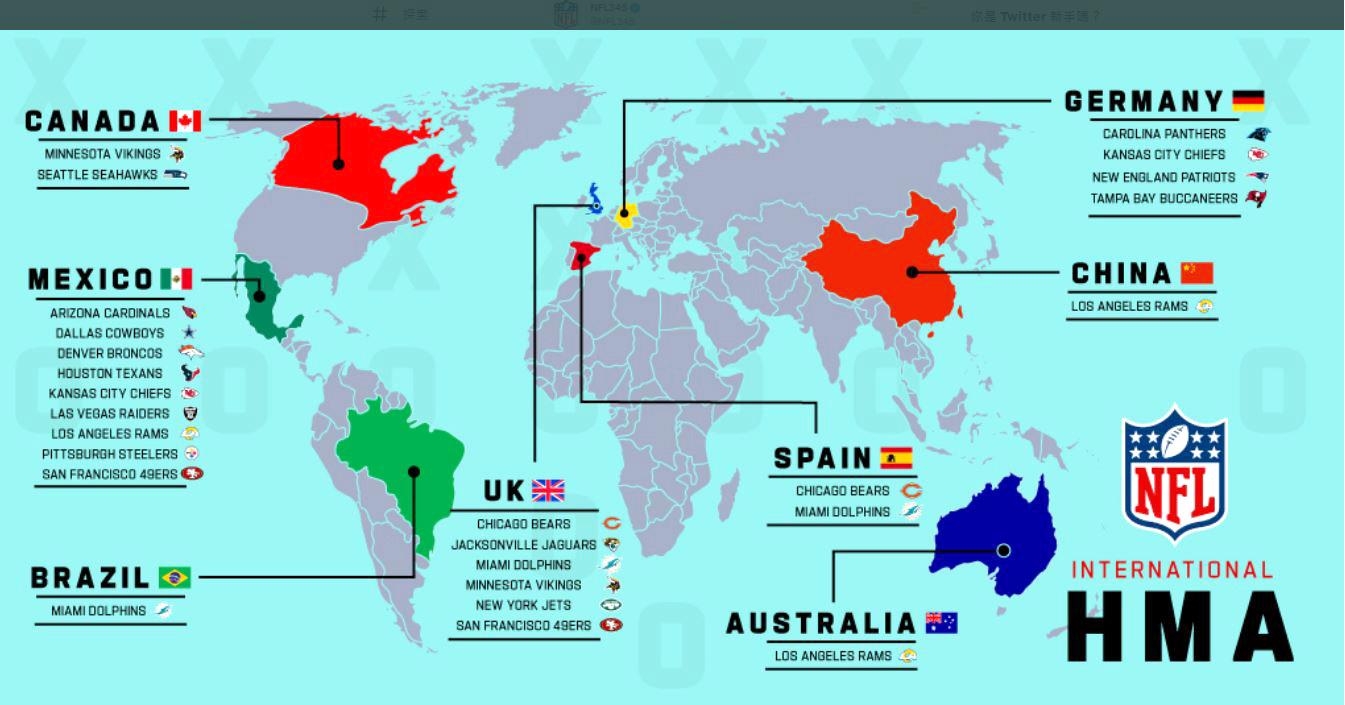US President Joe Biden on Friday signed into law a sweeping US$1.5 trillion spending bill, which includes a ban on the use of any maps by the US Department of State and its foreign operations that “inaccurately” depict Taiwan as part of China.
The Department of State, Foreign Operations and Related Programs Appropriations Act, 2022, stipulates that “none of the funds made available by this Act should be used to create, procure, or display any map that inaccurately depicts the territory and social and economic system of Taiwan and the islands or island groups administered by Taiwan authorities.”
The bipartisan Consolidated Appropriations Act, an omnibus spending bill, is to fund federal government agencies for the remainder of fiscal 2022 to avoid an immediate government shutdown. The US Senate on Thursday approved the bill 68-31 and sent it to the White House.

Photo: Screen grab from the National Football League Communications’ Twitter account
The appropriation act was proposed in July last year by lawmakers including Republican US representatives Tom Tiffany, Steve Chabot and Scott Perry, who are friendly to Taiwan.
The bill that same month passed the US House of Representatives by a 217-212 vote, but did not move beyond the Senate and was instead packaged into the omnibus spending bill following revisions.
The original bill had stipulated: “None of the funds made available by this Act may be used to create, procure, or display any map that depicts Taiwan, Kinmen, Matsu, Penghu, Wuciou [烏坵, islands administered by Kinmen County], Green Island (綠島) or Orchid Island [Lanyu, 蘭嶼] as part of the territory of the People’s Republic of China.”
Tiffany told the House that since the 1970s, the US has adopted a “one China” policy to accommodate Beijing’s claim that Taiwan is part of China.
However, he said “Beijing’s bogus argument that Taiwan is part of Communist China” should be abandoned, adding that the bill would “require honest maps that stop perpetuating the ‘one China’ lie.”
The Ministry of Foreign Affairs yesterday thanked the Biden administration and US lawmakers for supporting Taiwan-US relations.
The ban on inaccurate maps shows that the US “recognizes Taiwan as not being a part of China and is willing to take legislative action to ensure truthful depictions of the situation across the Taiwan Strait,” it said in a statement.
Legislative Speaker You Si-kun said on Facebook that the ban would prevent US taxpayer money being spent on maps that show Taiwan as a part of China and instead use the funds to support “honest maps.”
“Taiwan is not a part of China. We thank US lawmakers in the US Senate and House of Representatives for their nonpartisan support of Taiwan and look forward to the growth of Taiwan-US relations,” he wrote.
The 2,741-page Consolidated Appropriations Act would also provide US$13.6 billion in emergency aid to Ukrainian refugees fleeing the Russian invasion, as well as weapons to NATO’s eastern European members.
Senate Majority Leader Chuck Schumer said the aid would include US$1 billion in military assistance, such as Javelin and Stinger missiles, to cement the alliance’s military strength.
The financial assistance also aims to fend off cyberattacks from Russia, he added.
Additional reporting by Yang Cheng-yu and Chung Li-hua

A magnitude 5.6 earthquake struck off the coast of Yilan County at 12:37pm today, with clear shaking felt across much of northern Taiwan. There were no immediate reports of damage. The epicenter of the quake was 16.9km east-southeast of Yilan County Hall offshore at a depth of 66.8km, Central Weather Administration (CWA) data showed. The maximum intensity registered at a 4 in Yilan County’s Nanao Township (南澳) on Taiwan’s seven-tier scale. Other parts of Yilan, as well as certain areas of Hualien County, Taipei, New Taipei City, Taoyuan, Hsinchu County, Taichung and Miaoli County, recorded intensities of 3. Residents of Yilan County and Taipei received

Taiwan has secured another breakthrough in fruit exports, with jujubes, dragon fruit and lychees approved for shipment to the EU, the Ministry of Agriculture said yesterday. The Animal and Plant Health Inspection Agency on Thursday received formal notification of the approval from the EU, the ministry said, adding that the decision was expected to expand Taiwanese fruit producers’ access to high-end European markets. Taiwan exported 126 tonnes of lychees last year, valued at US$1.48 million, with Japan accounting for 102 tonnes. Other export destinations included New Zealand, Hong Kong, the US and Australia, ministry data showed. Jujube exports totaled 103 tonnes, valued at

TRUST: The KMT said it respected the US’ timing and considerations, and hoped it would continue to honor its commitments to helping Taiwan bolster its defenses and deterrence US President Donald Trump is delaying a multibillion-dollar arms sale to Taiwan to ensure his visit to Beijing is successful, a New York Times report said. The weapons sales package has stalled in the US Department of State, the report said, citing US officials it did not identify. The White House has told agencies not to push forward ahead of Trump’s meeting with Chinese President Xi Jinping (習近平), it said. The two last month held a phone call to discuss trade and geopolitical flashpoints ahead of the summit. Xi raised the Taiwan issue and urged the US to handle arms sales to

BIG SPENDERS: Foreign investors bought the most Taiwan equities since 2005, signaling confidence that an AI boom would continue to benefit chipmakers Taiwan Semiconductor Manufacturing Co’s (TSMC, 台積電) market capitalization swelled to US$2 trillion for the first time following a 4.25 percent rally in its American depositary receipts (ADR) overnight, putting the world’s biggest contract chipmaker sixth on the list of the world’s biggest companies by market capitalization, just behind Amazon.com Inc. The site CompaniesMarketcap.com ranked TSMC ahead of Saudi Aramco and Meta Platforms Inc. The Taiwanese company’s ADRs on Tuesday surged to US$385.75 on the New York Stock Exchange, as strong demand for artificial intelligence (AI) applications led to chip supply constraints and boost revenue growth to record-breaking levels. Each TSMC ADR represents